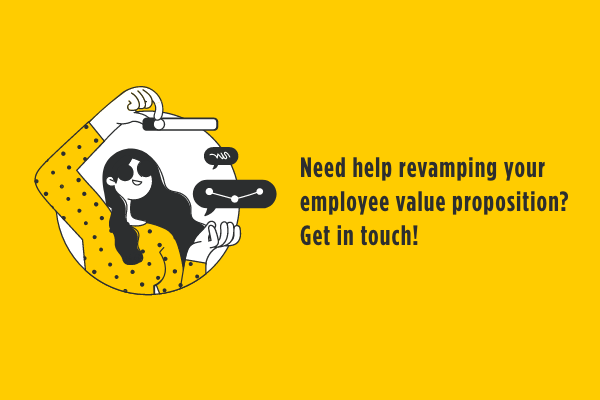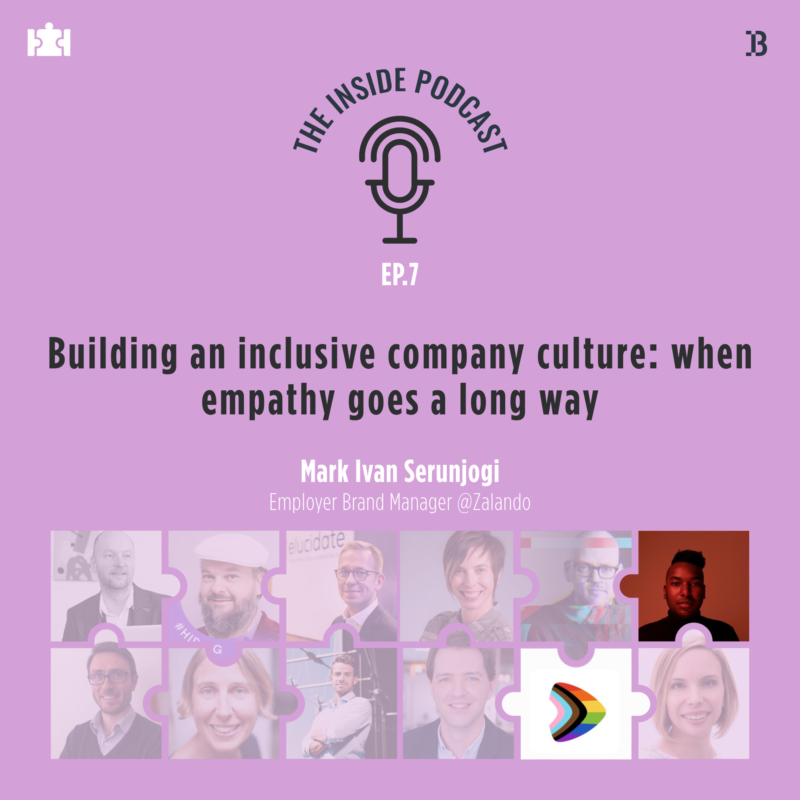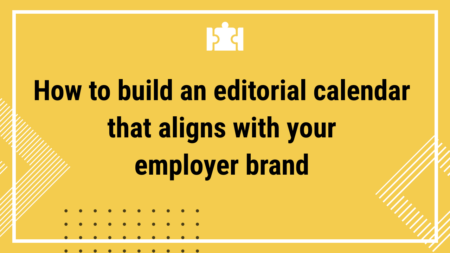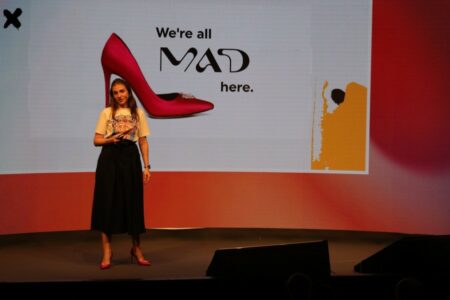Overview
In episode 7 of our 5th season, we had an interesting conversation with Mark Ivan Serunjogi, Employer Brand Manager at Zalando. We talked about diversity and inclusion in employer branding, and why is it so important to #accept people for who they are. We learned that the key to building an inclusive culture is honesty. Becoming open and acknowledging that we’re all humans and we’re all different, and that’s amazing really does reinforce #CompanyCulture.
What you’ll learn by listening
- Adaptability, the key to understanding employer branding
- Diversity & inclusion in employer branding: when empathy goes a long way
- An inclusive culture accepts and welcomes people as they are
- Reinforcing company culture starts with leadership, regardless of company size
- Owning up to your mistakes & becoming more open to improving company culture
- Employer branding in Europe vs the US
- Brand reputation and its impact on both candidates and customers
About Zalando
Founded in Berlin in 2008, Zalando has grown from being a pioneer in the world of e-commerce to becoming a leading European online platform for fashion and lifestyle. We connect customers, brands, and partners in 25 markets and employ more than 17,000 talents from 140 countries. We drive digital and sustainable solutions for fashion, logistics, advertising, and research bringing head-to-toe fashion to almost 49 million active customers, fueled by our vision of becoming the Starting Point for fashion – one that is welcoming to everyone.
Podcast link – Enjoy listening on Spotify!
Podcast transcription – Employer Branding T.I.P S05Ep.7
Georgiana:
Hi! My name is Georgiana. I am the CEO and founder of Beaglecat and soon you will be listening to Employer Branding: The Inside Podcast. In this podcast, I regularly talk to employer branding managers and acquisition managers, and human resources managers in tech companies in Germany, Romania, in the US. For more content on employer branding-related themes, go to employerbranding.tech or beaglecat.com. Stay tuned!
Hi, everyone! This is Georgiana with a new episode of Employer Branding: The Inside Podcast. Today I’m talking to someone whom I’ve been stalking for a very long time on LinkedIn. And he finally accepted to talk to me. We met in person and today we meet online and we’re going to share a lot of interesting insights. I mean, he’s going to share a lot of interesting insights on diversity and inclusion. His name is Mark Serunjogi. Am I pronouncing correctly, Mark? Welcome. Thank you so much for being with us today. Mark works at Zalando as an employer branding manager, and he’s also an employer branding strategist. But I’ll let him introduce himself because that’s how it should be.
Mark Ivan Serunjogi:
Well, thank you so much for already that introduction. Yeah, so my name is Mark Serunjogi, and I work at Zalando as an Employer Branding manager. I have been doing Employer Branding now for about four years. And before that, I was working in digital marketing, and advertising, and also done a lot of general, I would say, marketing and communications-related work. Yeah, pretty much for about 10 years now. Yeah.
Georgiana:
Yeah, it does seem that way, because we share a kind of similar background. And it was really nice when I first met you to be able to talk about all these topics that are somehow related. We spoke a lot about what happens in Berlin at the moment in terms of employer branding, and what happens in terms of recruitment, especially in tech companies. And I was complaining to you sort of that I hear a lot of talks, and very little action, when it comes to actually implementing policies. And you shared my point of view. Why would you say that happens?
Mark Ivan Serunjogi:
I think, first of all, it’s even an interesting time now, because even from when we talked, the first time, I already feel like the market is changing again, in a different direction. When we were talking, we were still in that sense that you know that hiring is in general, really, really hard, especially for teams that are hiring people in tech.
And it seems that a lot of people are having the same conversations over and over again, about like how hard it is, but we haven’t seen a lot of conversations about like, okay, what are actually the tactical or strategical solutions that can help here, even if everybody is hiring at the same time, it’s hard to find those really, really good case examples of where people are turning things around when it comes to specifically even Employer Branding. It’s also rare to get those cases where you see like, wow, they really were able to solve their problem from end to end, you know, employer branding, recruiters, people and hiring a team like as one team as one unit is always like, you have a little bit here a little bit there. But like really thinking about not only Employer Branding, but talent, attraction, talent acquisition, and talent retention, as part of one big whole.

Georgiana:
And maybe in a way, just, I don’t know, think of the marketing funnel, and then try to replicate it to the recruitment marketing funnel, or just simply the recruitment funnel. I think that can also be a solution that some recruiters and marketers could adopt. But anyway, you’re one of the very few people that I know who has been doing employer branding for quite a while. This is rare, okay. Usually, you would have people from HR who are transitioning into Employer Branding or people from marketing, such as me who are doing the same thing. I’m wondering in all this time in which you’ve also done marketing, and you’ve had a lot of involvement with diversity and inclusion. What do you feel has changed in employer branding? What have you learned? What are the key takeaways?
Mark Ivan Serunjogi:
Yeah, I feel like I’ve learned so much like it can be hard to really make concrete. But even as you said, the first starting point was that I came in as a marketeer and I still consider myself to be a marketer. Yeah, and look at recruitment has really like, you know that we do have like a marketing funnel that we need to go through. And I’ve learned a lot of the things you can adapt from the marketing space into to recruitment. I still think about the role, and let’s say the company culture in the end, like a product that I’m trying to sell.
I’m trying to make candidates really believe in this product and buy into it. And hopefully, once they bought it, meaning once they are hired, they are happy, and they’re not asking for any returns. So I still think of it in terms of marketing and selling a product aspect. But be very mindful that we are dealing with people, that we’re dealing with actual human beings and their lives. And especially if we’re asking people to relocate as well for a job, there is a responsibility to make sure that these people and their families are having a good experience when they are joining this company, and when they merge their lives, their dreams and their hopes with the company.
So I think what I’ve learned coming from marketing is how important that people’s space really is; and how I am so honored and in awe of being a part of that work. But also that it can be really, really beneficial to a company when it’s done well, almost as much as it can be really, really detrimental to a company when it isn’t done very well.
Georgiana:
Exactly. I know you you advocate a lot for diversity, and I didn’t get to ask you this in person. Why is this a topic that’s so important for you?
Mark Ivan Serunjogi:
First and foremost it’s also a personal topic. You know, I’m a black man from Denmark. So I’m part of a minority. I also identify as queer, so kind of minoritized in that sense. And growing up, I definitely felt like I missed role models in my own life that I really could look up to, and that I could follow in their footsteps. But also a few times having experienced discrimination or being unsure if something that happened to me was because of discrimination or that I didn’t get some opportunity because of my name or you know, things sounding very promising over the phone.
But then when I show up for the interview, I can already see on the recruiters’ faces that there’s something that’s not matching expectations. So feeling that once I really got into, you know, working and having my career going this idea of like how can I give back some more to society or like to community around me. That is where I fell in love with employer branding. Coming from marketing, loving working with brands, of course, and the products that I’ve been a part of. But kind of missing that part of how do I give back some more, and employer branding felt like a way that I can combine all the aspects of doing marketing, which I love, but focusing on people, but also looking at how do we then also create more? Yeah, more, I wouldn’t say more opportunity, but creating easier access for people that are also minoritized. And also shows that we all have value, that we can add to the company.
Georgiana:
I absolutely agree. And I remember discussing this topic with you over coffee when we met and we said that, in the end, it’s all about being open-minded, and just taking everyone into account regardless of background, sexual orientation, or whatever. And so I’m wondering, in the end, where does Employer Branding overlap with diversity and inclusion in a way that companies can apply?
Mark Ivan Serunjogi:
I think for me and it’s not to belittle it, but for me, it’s very simple in the sense of like, we’re talking about employer brand and we talk about what is an attractive workplace and how do we want to brand and market this attractive workplace so that it becomes top of mind of people? And for me, obviously as also someone who is a minority in Europe, an attractive workplace for me is an inclusive workspace. So for me, those two points are very much aligned like then they can’t really be separated.
A good workplace where you feel that you are appreciated. You are acknowledged. You can have an impact. You can learn, you can grow, and there’s space for you to come as you are, but also to grow into who you want to become. And acknowledging that we are all different people, not only based on our gender, or race or sexual orientation, but we are all individuals. And we all have different paths, different ways that we grow, and different needs. So a good workplace is actually a place where Yeah, we have structure, we have processes in place, we have rules, guidelines, and principles, but how are we also inclusive within that framework to be adaptable to all the individual needs, and the more flexible we are, the more attractive we are to different kinds of people. And so, if we say we want the best, well, the best can come in many different packages, and we need to be prepared for them.
Georgiana:
And actually, research recently shows that the more diverse and antagonistic, I’m not sure in a way a team is, the better it is for the success of the company and for cooperation.
Mark Ivan Serunjogi:
Yes, because we’re coming in with our different experiences. And so when we look at solutions in different ways, we actually can, in the end, complement each other. Or even if there’s a little bit of disagreement, we might even make our arguments even stronger than they were because we need to account for whatever gaps we missed the first time around.
Georgiana:
One of my guests in a previous episode was saying, if I, for example, was working with another 40 Georgiana’s in a company, that would be extremely boring, or we would end up fighting a lot. And I’m not talking about constructive fighting. So I think it really makes sense, just like I said, to broaden the horizons or the policies when it comes to recruitment. And then yeah, just get the best out of everyone in the end. One more practical question, if I can call it that way. Would you say it is easier for bigger companies such as the one you work with? But let’s not mentioned necessarily mention Zalando. Is it easier for a bigger company, a company that has more financial means to set in place the sort of strategies? Or is it something that every company, every founder can look at?
Mark Ivan Serunjogi:
I think it’s something that every founder can look at it and put in place. Of course, the bigger you are, the more resources you have, it is easier to support the choices or the decisions that you can make the leadership of saying, I want to support this, or I want to have an explicit diversity inclusion strategy, or I want it to have to be baked into our values or in our development framework or the way that we evaluate our employees. But I think that this can start even with the very small startups of saying, you know what, okay.
Do I want to have this be ingrained into my organization from the beginning so that people think about us and think of our brand, already think of this as an inclusive place? And I think this is some of the things that I’ve been noticing that are new in the Berlin landscape is that I’ve seen, you know, more small startups that are actually thinking about inclusivity. And thinking about Employer Branding, from the beginning, and thinking like, Oh, this is not an add-on for us to add on later. This is actually something that we need to have now to be able to attract good people that are willing to come into this company at a very, very early stage and believe in us, but also for them to take a stance in terms of let’s say investors, and VCs are saying this, these are principles, these are values.
And this is also how we intend to grow and how we intend our company culture to grow. With, we know with the staff base, or as we are, you know, gaining more customers. And that is something that I think it is a sign of the times is that it’s gone from being something that is a nice to have, and like the fourth or fifth iteration of company development, but even coming closer to the beginning stages of thinking of how to actually build a good company.
Georgiana:
I think you’re completely right. And I spoke to one very insightful founder last week, and the episode is going to be out soon. And what happened is that he reinforced again, for me, the fact that the values of the company and the policies of a company in the end are going to be an extension of the personal values of the founders. You know, from the very beginning, when there are just 20 people in the company, if the founder or the founders are set on really sticking to a certain type of culture, then that is going to be the way they go.
Mark Ivan Serunjogi:
It really sets the foundation in such a foundational way, but it really does. And it doesn’t mean that things cannot change, of course, and I’ve also seen that even for myself in companies that I’ve been in, things can change over time, and people can learn and people can grow, and they can make new decisions, and which is, of course, are completely valid. But it really starts with those decisions taken in leadership. And that’s why I will say that, yes, money helps, resources help, having a big staff of like more than 1000 people helps. But even a small company can have leadership that makes the decision from the beginning.
Georgiana:
Totally. And I have to also tell you that they don’t have any trouble recruiting.
Mark Ivan Serunjogi:
Because I mean, that’s also sometimes when I think if you just think as a person, if I have to be biased is like, of course, I want to work somewhere where it’s nice and comfortable. And people are treated well and people are being considered and when my colleague is, let’s say going on maternity leave, that they are getting, like a nice package and are well taken care of when they come back, we are ready, or you know someone who is sick, or someone who has a sick family member, that we all can band together and really be I would say this friendly, if not friends than being friendly, and being kind and showing kindness to each other. Like, how does that sound like a bad company? I don’t know.
Georgiana:
Oh, it does not? It does not. So this means that there is hope for all companies and that also means that not having enough money is just an excuse in the end.
Mark Ivan Serunjogi:
Right? Yes, you said it. You said it. I agree. Yeah. Money. I mean, money is not an excuse. As I say like, sometimes it’s not let’s not overcomplicate. Being nice is not really complicated. So it will say like, oh, this is not about being nice. This is business. But we can always make a decision about what kind of business we want to be, and how we want to practice that. So yeah, it’s never too late to start. And there’s not a point where you can have made so many mistakes that you can’t try to rectify them or do them over.
And I think that a lot of times with companies, the fear of beginning this work is actually the fear of facing the mistakes that they have made in the past, not only in terms of DNI but in general when it comes to people management, you know, what, when we want to revise, I don’t know, you want to revise promotion standard, it can be hard to go through that work, because you have to realize that, wow, we’ve been doing it really bad and doing it really the wrong way until now. And I think it’s very human to be afraid of that. And that’s, that’s actually the bigger challenge than actually having money. It’s really about like facing the things that need to be better. And in many cases that list is long.
Georgiana:
Oh, yes. Oh, yes, it is. There’s one more direction I’d like us to look at before we end this episode. We also talked when we met about how in a sense employer branding in Europe is a bit behind, let’s say when compared to the United States, for example, or even the UK. And I was telling you that to me, it seems like it. History is sort of repeating itself. Because when I was starting with content marketing and digital marketing about 10 years ago, 11 years ago, I learned everything I learned by myself from the US and at that moment in Europe and especially in Eastern Europe, where I was at the time nothing was happening. And I even brought this topic into a discussion with James Ellis, he confirmed that indeed that is the situation. The US is better positioned than we are when it comes to employer branding. So what why do you think that is, what’s your take on it?
Mark Ivan Serunjogi:
Well, you know, with a little bit of fear of sounding very, very socialist, but I think it’s because America is just much more of a developed capitalistic market. When you look at a business like that is really kind of like, almost like the birthplace of, of business and how they do things. They’re like things are highly competitive. They have less governmental subsidies and support than then than we do as far as I am aware. So even when it comes to talent, and when it comes to people, there’s so much more competition in terms of how you get people to want to work for you.
Also, the US is a country that is almost the size of half a continent. And yet, there’s much more tradition to be moving states for jobs and moving states for work. So people have also culturally more used to traveling for the right opportunity, which means that even when you are on the East Coast, you can go and take a job on the West Coast, which means that those companies are essentially still in the same market, even though they are on each side of the continent. And so that kind of competitiveness when it comes to companies, when it comes to people, especially also a company that is driven by innovation, technical advancement, which is of course, all supported by the money that is made in that market, I think the people and having the right people come in when you need them is very, very important.
Something you need to have here and now. And then that needs to have a role like an employer branding, someone who comes in and helps the company, showcase and tell the story of why they are the right place to be working. That’s where that is born as well. And I think that that is moving now over here because we are catching on. And there’s much more competition with tech companies in Europe, with pharmaceutical companies. Also now we have FinTech which is blowing up and trying to be nontraditional from the banking system. So these advancements and with more of them on the market, of course, you need also there someone who does the marketing for you, as a company, because you’re not just selling a product anymore, you’re also selling a workplace.
Georgiana:
Indeed, indeed, and speaking about selling the workplace, I have many acquaintances and friends in Berlin and in Romania that are tech recruiters and talent acquisition managers and HR managers. And I know about their huge workloads. And I know how difficult it is for them to have someone on the team to help with employer branding because they are like I said, overworked, and overburdened all the time. So I get the feeling that there are things not working in recruitment. And of course, this is something that we can all agree to. I’m wondering, are there any ways we can change the status quo? Are there systems we can put in place processes?
Mark Ivan Serunjogi:
Sometimes I think this is just, of course, my personal observation. I’m sure someone could be listening and highly disagree. But for my observation, I feel that sometimes recruitment and the recruitment process is centered too much around the client, or the customer, as the ones who are hiring, versus having the candidates and people applying to be the customer or the client. And I feel like that skews a process where processes or workloads, tend to be a lot because it’s centered around making a customer happy. And if you are dealing with the mindset that the customer is always right, well, then, when people say, we need more, we need more, work more work harder, close more roles.
Well, if they’re always right, well, then that means that that’s what you need to be doing, at the expense sometimes of the candidate’s experience. And I feel like if we turn that around, and of course, I am also being biased as an employer branding manager because I would like that anybody that I motivate to go apply for a role, or go interview with my colleague, that they had the best experience so that they don’t come back and give feedback that the impression they had of the brand is wrong.
So of course my bias is that the processes should be much more centered around the candidates. But that’s also because I feel like that is where the reputation of where the brand lies like they are the people that will be based on their experience the world and say, this is a great company, this is a great brand, what you see is what you get, or they will go out and say I interviewed there and I can tell you that that is not true because I had a very, very bad experience. So as you said we can solve it in one pack.
I really encouraged to think about, like, how do we build these processes so that that, that we send to the candidate and not only good candidates because we never know who is a good candidate, the person who is a bad candidate today can be a good candidate in six months, exactly a year, or that, quote, unquote, the candidate isn’t the right fit, will go out and really make damage to your reputation to the point that you actually that actually reaches people that are your target audience. So reputation management is actually something that we need to be doing with every candidate that we are in touch with. That means that the process you need to be to be centered around that. And if we have too many roles, or dealing with too many people, that we don’t get back in time, that we end up ghosting people that you know, that there’s a lot of miscommunication. We make it we make things harder for ourselves, for the candidate, but especially also the brand. If we say that we if we do believe that, that the employer brand isn’t is an important thing.
Georgiana:
Yeah. And that’s where it should come into place and help you attract better candidates and not more candidates, because that’s not what you need. You need good for the roles in your company, you don’t need everybody taught.
Mark Ivan Serunjogi:
Exactly. Of course, we always have these metrics that are showing us okay, how many how many applications do we need, usually fulfilling a role, etc? And that is true. But again, how do we shift that mindset from from quantity to quality? Because yes, it could be that you need, you know, 100 applications to get one hire, maybe usually. But at the end of the day, do you need that one? Yes, you need that one good fit in time, that when you give the offer they accept the offer. So maybe also, maybe we should focus less on getting those 100 applic applications?
Because that’s what the data says and more of like, how do we make sure that we get to the point where we have that one good fit, and also at the right time. And even if we then mean that we only reach 30 people because we took our time we were more diligent? Well, the end result will still be the same, right? But we got our higher and we and we we had 29 other people who got rejected, but they actually had a good experience. Yeah.
Georgiana:
And the one person who actually made it to the interview did not have to go to 15 or 17 steps to get hired. Yes, indeed, Mark, this has been so much fun. And insightful, just like the first time we met. Thank you so much for talking to me. Unless there’s someone else you’d like to share. No.
Mark Ivan Serunjogi:
I mean, thank you so much for having me. And it’s been a joy to talk with you as well. And yeah, I hope whoever’s been listening that they’ve been enjoying it. Yeah.
Georgiana:
For sure they will get something out of it. Thank you so much, and good luck. Thank you.







